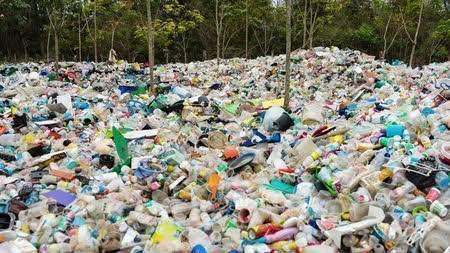A EU plan to ban single-use plastic products such as disposable plates and straws was agreed upon in Brussels on Wednesday.
Austria’s federal minister for sustainability and tourism, Elisabeth Koestinger, tweeted that a deal had been reached, describing it as “a milestone in our efforts to reduce plastic litter.”
Austria currently holds the rotating EU presidency.
The provisional agreement still needs to be officially approved by EU states and the EU parliament, and is expected to come into effect in two years time.
In May, the European Commission proposed banning a range of single-use plastic items for which non-plastic alternatives are readily available, while reducing the use of items such as plastic takeaway food containers.
More than 80 per cent of marine litter is plastic, the commission argued at the time.
On Nov. 16, the European Parliament had approved the ban with a vote of 571 to 53. The bill includes 10 single-use plastics that often end up in the ocean, including lightweight plastic bags and fast food containers.
Single-use plastics, such as straws, drink-stirrers, plates, cutlery and cotton-swab sticks, will be banned in Europe by 2021.
“We have adopted the most ambitious legislation against single-use plastics,” says Frédérique Ries, the European Parliament member, who drafted the bill.
“Today’s vote paves the way to a forthcoming and ambitious directive. It is essential in order to protect the marine environment and reduce the costs of environmental damage attributed to plastic pollution in Europe, estimated at 22 billion euros by 2030.”
Under the legislation, plastics– single-use burger boxes and food containers–that don’t have available alternatives will be reduced by at least 25 per cent by 2025.
In addition, 90 per cent of beverage bottles be collected separately and recycled.
Parliament is currently undergoing negotiations with European ministers representing individual member states, who are expected to decide on the legislation by Dec. 16.
In May, the European Commission proposed a ban on single-use plastics after discovering 80 per cent of marine litter is plastic, which is found on EU beaches and in marine species.
“Europe is only responsible for a small part of the plastic polluting our oceans,” Ries says. “It can and should, however, be a key player in finding a solution, leading at a global level, as it has done in the past in the fight against climate change.
“An EU directive that enables individual member states to impose a range of restrictions on packaging “risks a chilling effect” on the investment in innovation,” according to the organisations.
“We fully acknowledge the need to address the plastic pollution issue and more broadly we support the objective of the EU’s circular economy strategy,” says Hans van Bochove of Coca-Cola European Partners and Europen chairman.
Plastic waste is a particular problem for the world’s oceans, as its slow decomposition rate means that traces are often found in marine species such as sea turtles, whales and birds, as well as in the seafood that ends up in the human food chain.
Plastic pollution is impacting our waters and marine life, as well as our food chain and the public health. The good news is that global initiatives to reduce or eliminate the consumption of single-use plastic have been gaining momentum. (dpa/NAN)

